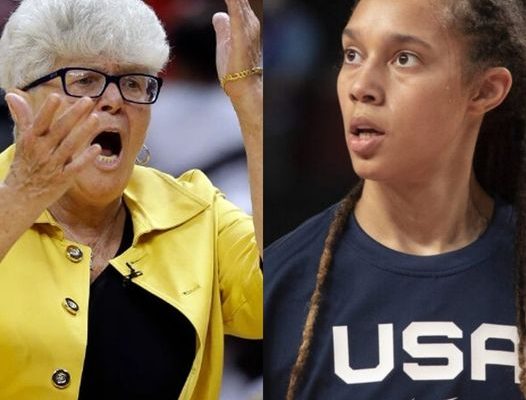
In a controversial and impassioned statement, Lin Dunn, the renowned director of the Indiana Fever, has called for the expulsion of Brittney Griner from the U.S. Olympic team. Dunn’s comments have ignited a firestorm of debate across the sports community, centered around Griner’s recent actions and the broader implications for athletes representing their countries on the global stage.

Lin Dunn, a seasoned figure in women’s basketball, has been a prominent advocate for sportsmanship and national pride throughout her career. Her recent remarks come in response to a situation that has polarized public opinion. Dunn’s criticism targets Brittney Griner, a celebrated basketball player who has been an integral part of the U.S. national team and a major figure in the Women’s National Basketball Association (WNBA). The catalyst for Dunn’s call to action appears to be Griner’s recent protest during the American national anthem, an act that Dunn and many others interpret as a sign of disrespect.
In her statement, Dunn expressed her frustration, stating, “When you disrespect the American anthem, you don’t deserve to represent this country.” Dunn’s position underscores a belief that national symbols, such as the anthem, hold a profound significance that athletes should respect when they are in a position to represent their nation. This sentiment is rooted in a broader context where sports figures are often expected to embody national values and pride, particularly on international platforms like the Olympics.

Brittney Griner, who made headlines not only for her impressive athletic skills but also for her outspoken advocacy on social issues, has faced backlash from various quarters. Her protest during the anthem was part of a larger movement where athletes have used their platforms to highlight systemic injustices and advocate for social change. While this form of protest has been defended by many as a legitimate exercise of free speech, it has also faced criticism from those who believe that such actions undermine the unity and honor associated with national representation.
Dunn’s call for Griner’s removal raises important questions about the balance between personal expression and national duty. On one hand, Dunn’s perspective reflects a belief in the sanctity of national symbols and the responsibility of athletes to uphold a sense of national pride. On the other hand, Griner’s actions are emblematic of a broader conversation about the role of athletes in addressing social issues and the extent to which personal beliefs should influence their professional roles.
News
Billionaire Elon Musk confirmed that he has 12 children with 3 women, he must start redistributing inheritance when the 12th child is born
Billionaire Elon Musk has officially confirmed that he has had a third child with his female subordinate Shivon Zilis. Currently, Musk has a total of 12 children with 3 wоmen. In an interview with Page Six (USA), Elon Musk (52…
Every time he wins an award, Siya Kolisi gives his wife an expensive supercar to add to his car collection
Following his relocation to France, Springboks captain Siya Kolisi has added a stylish new set of wheels to his collection. Feast your eyes on his latest vehicle! Kolisi was pleasantly surprised with a brand-new Range Rover, a generous gift presented…
Justin Baldoni’s Man Enough Co-Host Liz Plank Leaves Podcast After Blake Lively Claims: ‘We All Deserve Better’ (Exclusive)
On Dec. 20 Lively accused Baldoni of sexual harassment on set and a retaliatory public smear campaign in a legal filing Justin Baldoni, Blake Lively and Liz Plank. Journalist and author Liz Plank co-hosts the podcast The Man Enough with actor-filmmaker…
Heisman Winner Travis Hunter Deactivates Instagram Account as Hatred Toward Fiancée Leanna Lenee Continues
The controversy initially began as Hunter received the Heisman trophy and many fans called out Lenee’s behavior in videos that circulated online Travis Hunter Leanna Lanee. Amid the continued vitriol going around online about his fiancée Leanna Lenee, 2024 Heisman…
Tallulah Willis Reveals She’s Engaged to Musician Justin Acee
The 30-year-old daughter of Demi Moore and Bruce Willis announced her engagement on Monday, Dec. 23 Tallulah Willis announces engagement to Justin Acee. Tallulah Willis is ready to walk down the aisle! “Everyday @justinacee,” she wrote next to the social media post…
Blake Lively’s A Simple Favor 2 Costar Michele Morrone Says He ‘Felt Her Pain’ Over Justin Baldoni’s Alleged Behavior
Morrone filmed ‘A Simple Favor 2’ with Lively shortly after she wrapped ‘It Ends With Us’ with Baldoni Michele Morrone and his costar Blake Lively. Michele Morrone is lending his support to his costar Blake Lively. On Monday, Dec. 23,…
End of content
No more pages to load











